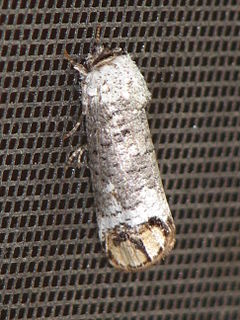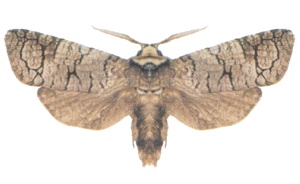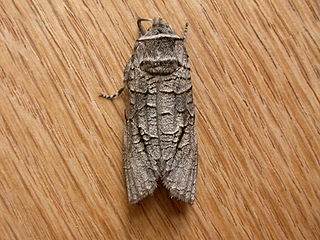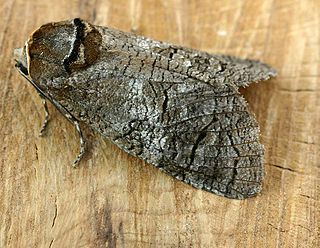Related Research Articles

The Cossidae, the cossid millers or carpenter millers, make up a family of mostly large miller moths. This family contains over 110 genera with almost 700 known species, and many more species await description. Carpenter millers are nocturnal Lepidoptera found worldwide, except the Southeast Asian subfamily Ratardinae, which is mostly active during the day.

Zyganisus caliginosus, the Australian goat moth, is a moth of the family Cossidae. It is found in Tasmania, Victoria and New South Wales.

Culama australis is a moth of the family Cossidae. It is found in most of Australia, except Tasmania.

Eucalyptus expressa, commonly known as the Wollemi stringybark, is a recently discovered Australian tree species. It has rough, fibrous stringybark on the trunk and larger branches, lance-shaped to curved adult leaves, flower buds in groups of between seven and twenty four and hemispherical to shortened spherical fruit with the valves extending well beyond the rim of the fruit.

Xyloryctidae is a family of moths contained within the superfamily Gelechioidea described by Edward Meyrick in 1890. Most genera are found in the Indo-Australian region. While many of these moths are tiny, some members of the family grow to a wingspan of up to 66 mm, making them giants among the micromoths.

Cossus is a genus of moths in the family Cossidae described by Johan Christian Fabricius in 1793.
Macrocyttara is a genus of moths in the family Cossidae.

Culama crepera is a moth in the family Cossidae. It was described by Turner in 1939. It is found in Australia, where it has been recorded from southern Western Australia, through South Australia to western-central Victoria and New South Wales.
Macrocyttara pamphaea is a moth in the family Cossidae. It was described by Turner in 1945. It is found in Australia, where it has been recorded from Queensland, South Australia, the Northern Territory, New South Wales and Victoria. The habitat consists of dry woodland.
Vartiania is a genus of moths in the family Cossidae.

The Zeuzerinae are a subfamily of the family Cossidae.
Cossodes is a monotypic moth genus in the family Cossidae. Its sole species, Cossodes lyonetii, is found in south-western Western Australia.
Zyganisus cadigalorum is a moth in the family Cossidae. It is found in Australia, where it has been recorded from the Sydney area.
Zyganisus fulvicollis is a moth in the family Cossidae. It is found in south-eastern Australia, where it can be found from Tasmania and Victoria to the Australian Capital Territory and New South Wales.
Sympycnodes arachnophora is a species of moth of the family Cossidae. It is found in Australia, where it is only found in inland south-eastern Australia. The habitat consists of dry woodland.
Catoryctis truncata is a moth in the family Xyloryctidae. It was described by Thomas Pennington Lucas in 1902. It is found in Australia, where it has been recorded from New South Wales and Queensland.
Illidgea epigramma is a moth in the family Xyloryctidae. It was described by Edward Meyrick in 1890. It is found in Australia, where it has been recorded from the Australian Capital Territory, New South Wales, Queensland and South Australia.
Lichenaula petulans is a moth in the family Xyloryctidae. It was described by Thomas Pennington Lucas in 1900. It is found in Australia, where it has been recorded from Queensland.
Lichenaula tortriciformis is a moth in the family Xyloryctidae. It was described by Thomas Pennington Lucas in 1900. It is found in Australia, where it has been recorded from Queensland.
References
- ↑ Savela, Markku (14 October 2013). "Macrocyttara expressa (Lucas, 1902)". Lepidoptera and Some Other Life Forms. Retrieved 23 July 2020.
- ↑ Kallies, A. & Hilton, D. J. (2012). "Revision of Cossinae and small Zeuzerinae from Australia (Lepidoptera: Cossidae)". Zootaxa. 3454: 1-62.
- ↑ Herbison-Evans, Don & Crossley, Stella (23 February 2017). "Macrocyttara expressa (T.P. Lucas, 1902)". Australian Caterpillars and their Butterflies and Moths. Retrieved 23 July 2020.
| This article relating to the moth subfamily Cossinae is a stub. You can help Wikipedia by expanding it. |